
|

|
ARCHIVES [2000] [2002] [2003] |
STEWART'S YEAR 2001 LOGS |
Seventh Log: 3/2/01-4/17/01Balboa Republic of Panama to Galapagos Ecuador by Stewart I really like the Pacific. The weather is calm and the water is cooler, which makes the floorboards in the bottom of the boat much more refreshing to take a nap on. The flying fish in the Pacific are a lot smarter than their cousins in the Atlantic. Not one has landed on the boat- so no fresh fish for me. We have been very adept at catching blue footed boobies. These not so smart birds, are quite amazing to watch. They spy fish from far up in the sky and then like a missile, shoot down straight as arrows into the water. They enter the water so straight they make no splash. Hovering over head are the frigate birds patiently waiting to steal a fish from the boobie once he emerges from the water. Our first stop in the Pacific was at Las Perlas islands. The doc and Phil found a lot of shells on the island, which they brought back to the boat. Later that night after they had gone to bed, one of the shells began moving across the table. I could see from where I was sleeping, many little legs while it was in motion, but each time I got up to investigate it, it sat still. It went to the edge of the table and then fell on the floor. I watched it go all the way forward to where Phil and the doc were sleeping. It climbed up the laundry bag and clung to the ropes suspending the bag. The very next morning Phil woke up and noticed the shell on the ropes. "Looks like we have a stowaway", he said, pointing to the shell. "Oh no, it's a hermit crab" said the doc. They named him Herman. He now lives in a drinking glass suspended from a cup hook, with a piece of coral and a patch of sand for his world. Every day he either has fresh water, sea water or no water in his glass. He eats my dry cat food. The doc said these crabs find old abandoned shells and move in to them. They were going to leave him on a beach in Manta, but the doc didn't like the beaches there, and there were no other crabs. She wants him to go back to his beach on Las Perlas. In one month he had gotten too big for his little shell. The doc is going to make him a new shell out of some "Sculpey" modeling clay, she has on board the boat. On March 9, at four a.m. we reached the equator. I was quite excited to get to the Galapagos. Our first landfall was on the island of San Cristobal. I had not expected these islands to be so big. I am used to the islands in Maine, where the island mass is more pancake-like . One Thanksgiving the Doc's Mom made candied sweetpotatoes covered with marshmallows. The marshmallows were put under the broiler for a light browning, only they caught on fire and the entire dish looked like a charred ruin. That is the Galapagos. The outer crust is volcanic, black and baked, but when you dig in, the contents are sweet and filling. As we travel westward through the island chain, we arrive at “newer” islands. Islands that are younger, than those to the east. The eastern islands are nearer to the mainland, and as a result, were the first to receive seeds and animals floating on the currents. They are greener and have a more finished appearance. Each island and its inhabitants are totally unique, which is at the core of Darwin's ideas. Many sea lions live in Wreck Bay. They live on the rocks and on some of the boats, pooping, peeing and making a huge mess everywhere. They bark like dogs, all night and all day long. The boats attract small fish, which feed bigger fish, which feed the sea lions. At suppertime you can hear the sea lions from inside the boat circling around the outside blowing bubbles up against the hull. A sea lion is not a seal, they are closely related, but seals don't have external ear flaps. We've seen porpoises and dolphins, so
big they look like whales from afar. At night they float in
the bow wave of Iwalani, leaving their own phosphorescent trail.
Some of the porpoises have strange scars on their backsides
twenty, or so, parallel lines that swirl, cross and make semi-circles,
like Inca Indian patterns. The doc thinks the designs were
made by sharks, Phil thinks aliens made them and I think they
were made by mermaids. We saw penguins, small birds that can't
fly through the air but can fly through the water like mini-torpedoes.
Marines Iguanas that on some beaches were so plentiful they
made the black rocks on the beach seem alive, as they slithered
and scrambled away. The Doc has been seeing patients on some of the boats- including a famous cat named Halifax, who spent an entire winter locked in a boat in the frozen arctic with her human named Alva. The humans were worried because Halifax has become very bored on the boat and tries to jump overboard to shore. One night a few weeks ago she almost drowned in Academy Bay, luckily a man heard her scratching on the outside of his boat and he was able to rescue her. Halifax's humans wanted to know if there was anything that could be done, so she wasn't trying to abandon ship. The doc thought about it for awhile and came up with a system she said worked on me. Operant Conditioning. Positive reinforcement for good behavior, negative reinforcement for bad behavior. She even gave them a bag of my most favorite cat treats. She said the humans looked at her like she was nuts, when she told them what they had to do. Any time Halifax was lying quietly down comfortably below decks, they were to reward her with praise and a cat treat, anytime she tried to jump over board, or into the dinghy, they were to blow the handheld foghorn. The very next day Halifax motored by in the dinghy with her humans, looking like the queen of the Nile, it didn't look like the humans were going to give the Doc's advice much attention. Personally, I think it was unrealistic advice myself. Halifax just needs more responsibility. When you have a lot of things that you have to do, like I do, sitting back and doing nothing becomes much more enjoyable. I am also in charge of bug patrol. After we left Panama, a cockroach was sited in the engine room. Phil screamed and became paralyzed with fear, the cockroach scuttled away. The second siting was a couple of weeks later and was the same cockroach, this time full grown to the size of a small hummingbird. Phil again became immobile and started screaming. The Doc came down from the cockpit and the two of them managed to subdue it and kill it. They were mad and looked at me, like I was responsible for the bug being on the boat. They said I was now in charge of killing any others that were sited. The Doc bought Raid cockroach traps and poison before we left Maine, because she knew they would be a problem in the South. These cockroaches are three times bigger than the trap, so those were a worthless investment. Luckily, for me, I haven't seen anymore of those bugs. They bring bug chasing into a whole new dimension, one I am not sure I really enjoy, I am in agreement with Phil, these bugs might fight back. I might let you in on a big secret. Phil and the Doc have not perfected the art of doing nothing. They are terribly bored during passages, frustrated, is maybe a better word. One night on the way to the Galapagos, the Doc was on watch up in the cockpit and Phil was forward asleep. I heard the Doc crying for no real reason, and saying her prayers, which come from St Francis of Assissi. Then I heard her ask, "Please show us a sign- which is the direction we are most needed". All of a sudden a huge shooting star crossed over Iwalani's mast toward the Northeast. "Whoa," I heard the Doc say, "that must have been a coincidence, most shooting stars must go in that direction based on the rotation of the earth- How ‘bout another sign?" Ziipppppp- another shooting star so big you could hear it, trailed off to the Northeast. She came back down the ladder, still looking sad, but maybe now a bit puzzled too and saw that we had e-mail. She downloaded the mail and saw it was from her sister, Whistle. Our dog Sydney had just died. She had been fighting the cancer battle and had finally given up. We will all miss her. -Stew Stewart's Log Chapter Eight A lot of you are probably wondering how it is that we managed to go West, when we were all set to go home via the Easterly route. Some have blamed a faulty compass, others bad weather along the Panama coast. Well I will tell you neither are true. The morning before Phil and the Doc went in to the Port Authority at Santa Cruz in the Galapagos for the zarpe, or clearance papers, neither of them knew what to tell the authorities. Phil wanted to go home as he missed Ben and Nathaniel. The Doc was leaning toward continuing on, although she was up in the air. She was homesick too.That left the deciding vote to me. I could not handle such responsibility and left them a coin to flip. It just so happens that the Ecuadorian penny was perfect for the purpose. On one side it had a picture of the world and on the other the #1, which all of you by now know is the #1 state in the United States- Maine! They agreed to flip three times and the best of the three flips would win. I don't need to tell you which side won. Spending
twenty-six days at sea wasn't any different for me. When
we arrived in the Marquises we met some people from a boat
called "Willy Bolton". There were two young girls named Eleanor
and Jessica on board. When they first saw me they called me
a "fetching" cat
which I thought was odd, as I was just lying on the bench,
not chasing a ball or my cat nip toys at all. In fact they
said a lot of odd things;
they seemed to be speaking English, yet, not. The girl's aren't so bad; in fact they are quite heavy handed with my
Bonkers cat treats which suits me just fine. They even wrote
a book about me, with several short stories called the "Cat's
Whisker's,"
a portion of which follow below. Despite the fact they aren't
actually in a classroom with other children, they seem far
wiser for their tender years.
They insist
on combing me each time they see me, which pleases the Doc,
but annoys me. If I wanted every hair in place I would do it
myself. Honestly, I can't
understand what the obsession some cat's (and people) have
with grooming every five seconds. All that hair just irritates
my stomach. We left the Marquises and traveled westward to the Tuomotos. These islands are flat just like the Bahamas. We left the Tuomotos and sailed to Tahiti. I caused the Doc and Phil a lot of trouble as they had to devote an entire day to getting me cleared into French Polynesia. Technically we were in French Polynesia when we entered the Marquesis, but I still had to have a French Veterinarian examine me. The Vet the French sent to examine me was a knock out. She looked like some kind of movie star with dark glasses and great gams. With that cooing French accent- vavavavoom!!! She didn't really examine me either. All she did was pass the microchip scanner over me and that was it. She looked at the Doc's paperwork for my health records and everything was in order. I had a rabies titer drawn before we left and that will be good for two years.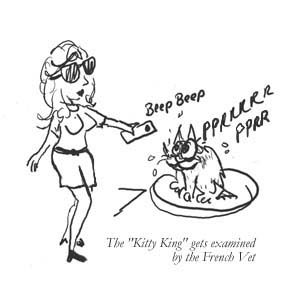 My
antibody levels were high, which is supposedly good. The Doc had given
me a Drontal tablet and had used Advantage on me. I had a Killed Rabies
booster before we left too. The good news is that my quarantine officially
started when we left Manta Ecuador. We hope that by the time we get to
Australia, six months will have elapsed and I won't have to spend too
long in their quarantine cages. The Doc is very worried that I will pick
up a disease from the quarantine station. She and Phil are figuring out
a way to camp out at the station with me. My
antibody levels were high, which is supposedly good. The Doc had given
me a Drontal tablet and had used Advantage on me. I had a Killed Rabies
booster before we left too. The good news is that my quarantine officially
started when we left Manta Ecuador. We hope that by the time we get to
Australia, six months will have elapsed and I won't have to spend too
long in their quarantine cages. The Doc is very worried that I will pick
up a disease from the quarantine station. She and Phil are figuring out
a way to camp out at the station with me. The French are trying to keep this part of the Pacific free from rabies. They are scared it is going to come in through a dog or cat cruising on board a sailboat. The Doc politely tried to explain to them, that their biggest risk is a large container ship or cargo plane, which could pick up a tiny little rabid bat in Panama, where bats and rabies are so plentiful. Cruising boats take too long to get here and even if they did pick up a rabid pet in Panama, by the time they were half way to the Marquises some signs most likely would have appeared. The Doc didn't realize she was arguing against this very fine ladies job. This French Veterinarian is sent out to every cruising boat that declares a pet on board on the customs sheet. I have to tell you I think the French are geniuses. They could have sent out a hairy old man and charged the cruising boats money, but instead they sent out a movie star and the price was free! What better way to get compliance with the law! The doc did this cartoon of me with her computerized drawing tablet. Now we are beginning the task of preparing for Australia. We basically have to arrive in an empty boat. The Australians remove all canned, fresh, and frozen meat, grains, honey, wood, nuts, herbs, plants, soil, vaccines, popcorn and shells. Which means all my cat food is taken too. I am almost out of cat treats, so I hope they have them there. They are probably made from kangaroo! 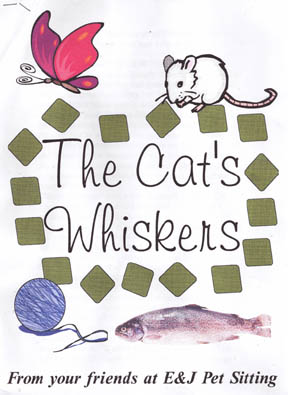
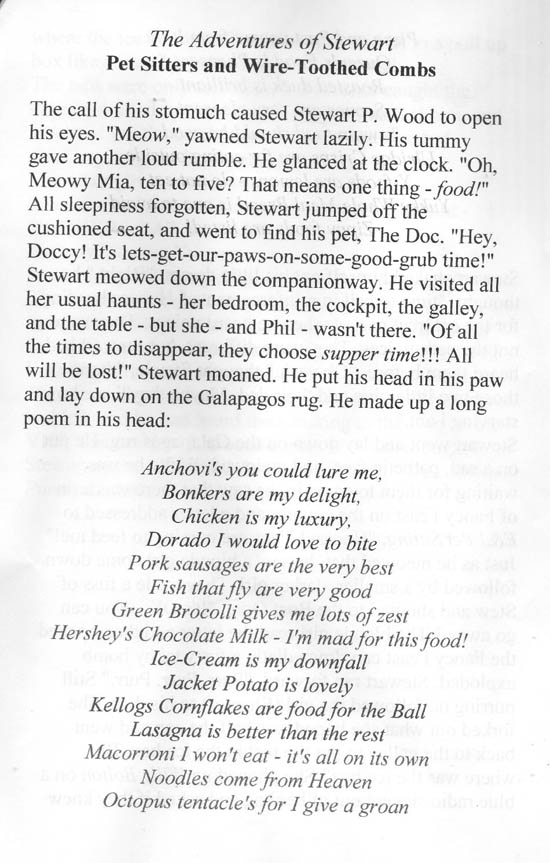
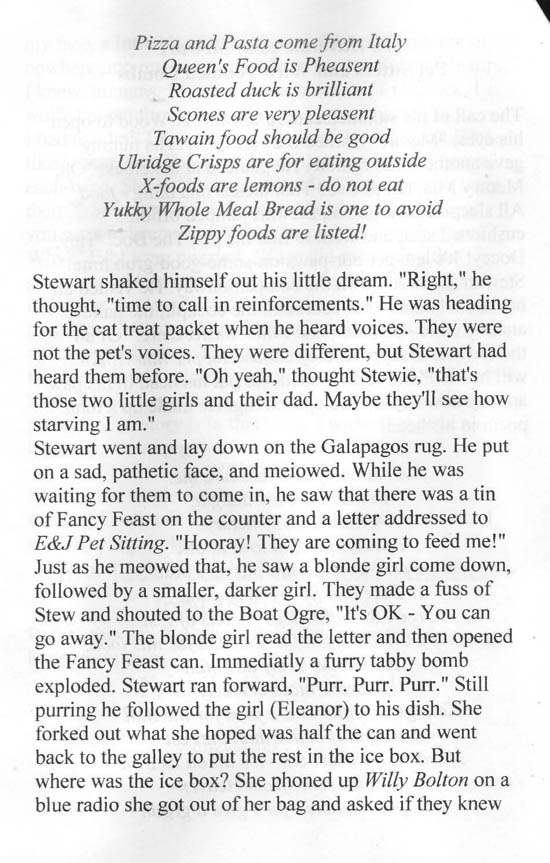
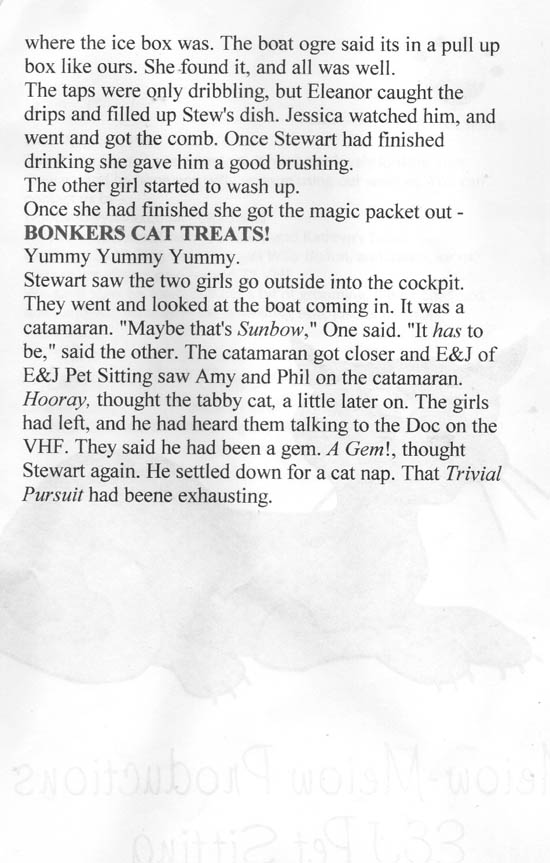
Stewart's Ninth Log: Bora Bora French Polynesia, to Noumea New Caledonia August 18, 2001 to November 15, 2001 We waved good-by to the Society Islands in French Polynesia on the seventeenth of August and headed for Suwarro, a National Park owned and managed by the Cook Islands. Suwarro is an atoll, configured much like the Tuomotos with an outer circular ring of small islands and coral protecting an inner lagoon. A small pass, or hole, through the coral allows boats to enter and exit.
The anchorage was very rough, as it was quite windy. We anchored in a rather tenuous position thirty feet upwind of the reef. The water in the lagoon was as clear as my water dish and very inviting. Unfortunately some rather aggressive sharks found it much to their liking also. They had never seen a cat before. They pretty much left me alone, not realizing I was edible. It was very important that the anchor didn't drag otherwise we would have been shipwrecked on the reef. We might have been stuck there a long time, as there are no airplanes that come to Suwarro. The only boats that land there are the cruising yachts and a ship which comes twice a year to drop off and pick up the Park Ranger and caretaker that live there half the year. A boat named Amoha had been there for several weeks repairing a broken rudder. While we were there, a seventy-year-old woman sailed her boat single-handedly from French Polynesia to bring him food and supplies. Her boats name was "Dessert First ". She has lots of guts and judging from the name of her boat, knows how to feed them. Two cats had been left on Suwarro by a cruising boat- a mother and son.
Neither had been neutered and the mother was now pregnant and due to have
kittens any time. The caretakers on the island said that they were going
to drown the cats. The Doc could not stomach this. She and Phil debated
for a day about all the options. She got together all the things she would
need to examine, sedate and operate on the cats on shore, as she was not
going to expose me to any potential diseases they might have had, if she
brought them out to the boat. But first they had to catch the cats. We left Suwarro and sailed to PagoPago in American Samoa. Both Phil and the Doc were anxious to see Pago as all the other cruisers and guidebooks called it the armpit of the Pacific. The crew of Iwalani tends to gravitate toward the offbeat areas. We arrived bathed in the moonlight of a perfectly calm evening. The full moon lit up the white sandy beach and dramatic rocky outcroppings. Steep jungle sided cliffs completely enclosed the "L " shaped harbor. It smelled like the inside of an antique cigar box, mixed with gardenia perfume and the faintest suggestion of...could it be? Yes, much to my delight- tuna cat food. This is the birthplace of all the tuna cat food in the U.S. The doc doesn't feed me this delicacy as she claims it is bad for cat's urinary systems. A lady came by the next day in her dinghy to welcome us to Pago. She gave the Doc a well-known brand of Tuna and Cheese, which could be purchased for 8 cents (U.S.) a can at the factory store. The doc figured one can couldn't hurt me, so I had it for supper. It was truly delicious. The next morning I awoke and felt like my bladder was on fire. I left a note on the table for the Doc telling her she was right about the canned tuna. The only piece of paper I could find was a scrap of paper on which was written the shopping list from the previous day. She didn't notice my writing and threw it away. I was miserable, but she still wasn 't catching on. So, I resorted to the technique used by other members of my species in similar situations. I peed on her side of the bed. She immediately saw what I was doing, (and all the blood) and fortunately for me, gave me a big hug and started me on some medicine. She felt awful that she gave me the canned tuna. It was time for my semi annual physical anyway, so she and Phil rented a car to find the Pago Veterinary Office to see if they had an ultrasound and in house blood chemistry, as well as some special food for my bladder. Pago was reported to have everything the U.S. had to offer, but when they came back to the boat, she said we had more equipment on board Iwalani, than the sole island Veterinary hospital. She and Phil took some of my blood and sent it off to the U.S. to re-check my thyroid, which luckily came back normal. She told me that from now on I could have no more treats-potato chips, corn chips, cookies or between meal snacks, I had to eat only my CD dry cat food and Fancy Feast, twice a day- talk about depressing. She did not give me a clean bill of health, but would tell me no more. We left Pago for Apia Samoa, an overnight sail in order to give "Willy Bolton " a part for their engine. Apia was the exact opposite of PagoPago. Where Pago was dark and drizzly, exotic and mysterious, Apia was flat, sunny, hot and noisy. The noise at night came from bars along shore playing loud music well into the wee hours; not native drumbeats or exotic songs, but the very worst of American disco. Every morning at exactly eight, a marching band wound its way along the shore. At first I thought the celebration was for me, but soon I realized it was the Samoan anthem marking the beginning of the workday and the ritual flag raising ceremony. The whole town came to a halt as the band marched, tooted and clanged their way to the town green in front of the government office, where the Samoan flag was raised up to the top of the flag pole. It gave me the idea that I should have an anthem too. When we said our "good-byes" to "Willy Bolton ", the girls obliged me by writing and singing my own personal anthem. Now I just need my own flag. It was a sad goodbye for us all. We left Apia and headed to Asau harbor on Savaii, a much quieter and less visited island to the west. It was also much cooler there. We caught up on our sleep and after a few days headed to Fiji. It was a very turbulent trip. Thunder and lightening and very rough seas were punctuated by periods of downpours. I tried to spend my time sleeping, but it was difficult. We found out later that a new island was being formed. Imagine that! Sailing along and all of a sudden seeing land push up out of the water like a rising submarine. Some people actually went out of their way to be in this hot zone. Streaks of red brown pumice floated on the surface of the water like breadcrumbs. It was an area I would not care to go back to. We arrived in SavuSavu, Fiji on Saturday afternoon and were told we had to stay on the boat until Monday. No problem for me. Monday morning eight official Fijians boarded the boat. The one in charge of inspecting animals was actually very nice and even took the time to come down and look at me. In most of the countries we visit, the doc and Phil pay money as a bond for me to stay on the boat and the officials never even bother to come out and see if I have any diseases. I have been having trouble with arthritis for many years. The next morning I could hardly move around. The doc examined me and said I wasn't getting any blood circulating to my legs. She found a very nice human doctor on shore and exchanged medicines for one that would thin my blood and stop blood clots from forming. She also started me on Aspirin, which is very poisonous to cats, but in small, infrequent amounts can be tolerated. The next day I was feeling better. It was then that I found out she is worried about my heart. I have a small heart murmur, which has gotten worse. I keep telling the Doc that my biggest problem is having a veterinarian for a mother. Every time I sneeze she is pulling out the body bag and saying my last rites. Perhaps the Doc's fears are partially justified. We heard over the radio that Talisman, the cat from the boat of the same name, passed away a week ago from kidney failure. She wasn't that much older than me and was certainly spryer, as I could see her jumping from the boom, to the deck, to the dodger on their boat like a trapeze artist. She always hissed when she looked over at me, but I know the Doc and Phil were very sad when they heard the news. 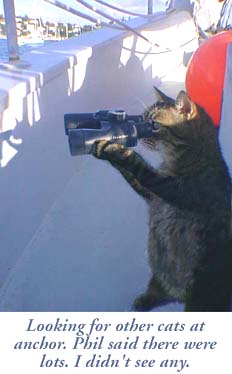 < <
Once we arrived in New Caledonia the Doc took me to some very nice French vets, in a splendid hospital and they let her use their ultrasound on me. Apparently my heart is not great, but is not as bad as she thought either. When we got back to the boat I had to go to the bathroom quite badly. In my haste to get some relief, I fell going in my hidy-hole and twisted my ankle. I couldn't put any weight down on my foot and my ankle was quite swollen. Now she was convinced I had cancer. A week later I wasn't any better, so she sedated me and did a joint tap. Still unconvinced, she took me back to the French Vets who x-rayed me. The X-rays showed I had a partially dislocated ankle. The Doc and the two French Vets tossed around some treatment options and the two French vets wanted to start me on Rimadyl, a non-steroidal drug much like Advil and Aleve. The Doc freaked and said "you can't use that on a cat!" They looked at her puzzled and said they did it all the time. The dose for any U.S. Vets that aren't using it on cats: 4mg/kg Q 24 hrs. It bothers her that she is falling behind on the information curve, while living on a boat. Sometimes I wish I had been born to a chef instead of a vet. Speaking of food, we have reached the pinnacle of gastronomic cuisine. I have been sampling some French cat food. Phil thought someone was cooking "homefried" potatoes and bacon when I got my first taste of the dry food. Last night I had "menus haches au canard, au poulet et aux petits legumes. Tonight is Mitonne a l'epaule de porc sauce aux olives. Tomorrow mijotee aux poissons blancs sauce tomatee. Unlike the US food which on the ingredient label says "meat by-products", (a vague term that drove the Doc nuts and made her complain to AAFCO, since for animals with food allergies, she could no longer tell what was in the food), the French food has in it exactly what the label says. As long as you can read French. When we get to Australia we can't bring in any fresh or frozen meat. Canned pork isn't allowed either. Since we don't know what's in my U.S. cat food we won't be bringing it into Australia. Before I can fully savor the French delicacies, I must first finish the American food. While enjoying all the smells, sights and sounds of New Caledonia, the
Doc and Phil have been trying to get the paperwork done for
my jail sentence in Australia. Australia and New Zealand are
the most difficult countries
in the world to bring an animal into. |
|
Stewart For anyone interested, my jail address is: Incarcerated cat
(Postcards, letters, or cat sized pipe cutters would be appreciated. I will be jailed over Christmas.) If anyone is interested in checking out the girl's from Willy Bolton's logs, they send them to their school in England.click HERE |
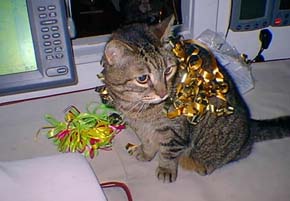 We all came on deck and celebrated, shooting off party poppers and drinking champagne. There was no wind so Phil shut the enginre down as we slowly drifted over- nothing. No blue line, nada, niet, ni, non, nothing. It looked like the rest of the flat still ocean. But Phil and the Doc said this was a very important part of the ocean. I must say it was very quiet, the solitude was soon invaded by a bunch of party seeking dolphins, who arrived puffing and splashing looking for fun. I was crowned "King Neptune" and our party ended fifteen minutes later. We can now see the Southern Kite. a constellation that is supposed to be equally as important as the Big Dipper, who's dip is very low on the horizon. The Southern Kite is supposed to be a cross, but it sure looks like a kite to me.
We all came on deck and celebrated, shooting off party poppers and drinking champagne. There was no wind so Phil shut the enginre down as we slowly drifted over- nothing. No blue line, nada, niet, ni, non, nothing. It looked like the rest of the flat still ocean. But Phil and the Doc said this was a very important part of the ocean. I must say it was very quiet, the solitude was soon invaded by a bunch of party seeking dolphins, who arrived puffing and splashing looking for fun. I was crowned "King Neptune" and our party ended fifteen minutes later. We can now see the Southern Kite. a constellation that is supposed to be equally as important as the Big Dipper, who's dip is very low on the horizon. The Southern Kite is supposed to be a cross, but it sure looks like a kite to me. 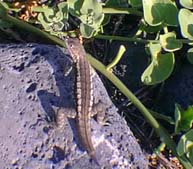 Lava
lizards, cute little guys, or girls, if they have red throats,
that are only five inches or so in length.
Lava
lizards, cute little guys, or girls, if they have red throats,
that are only five inches or so in length. I have perfected the art of doing nothing and take great enjoyment in its practice. You think I like writing these logs? It is a huge amount of work
I have perfected the art of doing nothing and take great enjoyment in its practice. You think I like writing these logs? It is a huge amount of work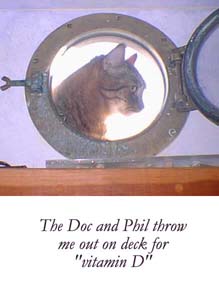 The
one good thing was that there was always an awake human if I wanted a Cat
treat. We caught enough fish that we didn't need to keep the line out all
the time. The only really bad thing that happened, was that Herman the
Hermit crab died. The Doc was very upset and gave him a burial at sea.
The
one good thing was that there was always an awake human if I wanted a Cat
treat. We caught enough fish that we didn't need to keep the line out all
the time. The only really bad thing that happened, was that Herman the
Hermit crab died. The Doc was very upset and gave him a burial at sea.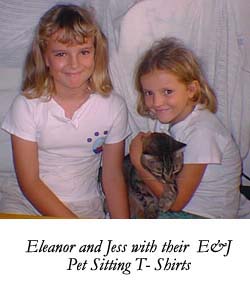 The
Doc said I was just used to "American" English and we would
all be talking the "Willy Bolton" way if we hadn't won the revolutionary
war. The girl's
had heard about me on the morning radio net and told their
parents they had to meet me. They wanted to set up a pet sitting
business and I was
going to be one of their first victims.
The
Doc said I was just used to "American" English and we would
all be talking the "Willy Bolton" way if we hadn't won the revolutionary
war. The girl's
had heard about me on the morning radio net and told their
parents they had to meet me. They wanted to set up a pet sitting
business and I was
going to be one of their first victims.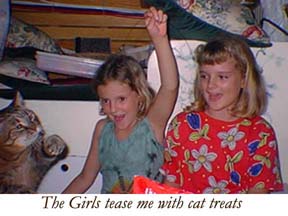 The
girls' now call me the Kitty King and his Royal Highness- at
least some human's respect my position in life.
The
girls' now call me the Kitty King and his Royal Highness- at
least some human's respect my position in life.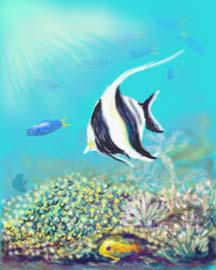 The water was even a prettier color than the Bahamas. It was the color of Berry blue jello. I could see down to the bottom, fifty feet below just by looking over the side. Lots of fish everywhere. We have no underwater camera, so the Doc rushes back to the boat and sketches the underwater scenery for me. Here are some more underwater fish.
The water was even a prettier color than the Bahamas. It was the color of Berry blue jello. I could see down to the bottom, fifty feet below just by looking over the side. Lots of fish everywhere. We have no underwater camera, so the Doc rushes back to the boat and sketches the underwater scenery for me. Here are some more underwater fish. 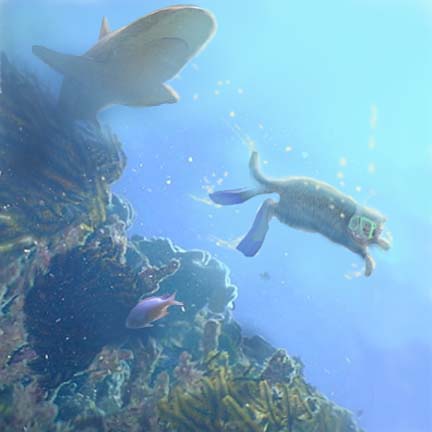
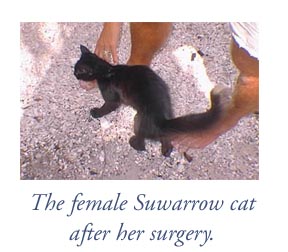 The
doc and Phil didn't
want the other humans to know what they were doing, because
it would make it easier for the cats to catch on. As everyone
knows we cats are great
mind readers. Without much trouble, they caught the cats and
soon had them anaesthetized and ready for surgery. It took
the doc a few seconds to adjust
to a coconut tree stump for an operating table, but she managed.
Both cats were up and running around a few hours after surgery.
What will happen
to them during cyclone season is anyones guess.
The
doc and Phil didn't
want the other humans to know what they were doing, because
it would make it easier for the cats to catch on. As everyone
knows we cats are great
mind readers. Without much trouble, they caught the cats and
soon had them anaesthetized and ready for surgery. It took
the doc a few seconds to adjust
to a coconut tree stump for an operating table, but she managed.
Both cats were up and running around a few hours after surgery.
What will happen
to them during cyclone season is anyones guess.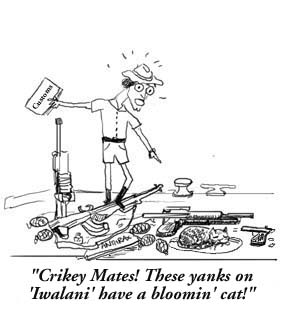 I
think it has been stressful for the Doc. On most of the forms
she got my date of birth wrong- by ten years. This held up
the paper work in Maine.
Most of the Vet's there, including the State Veterinarian,
who needed to sign my application request, know she is scatterbrained
and make allowances.
On the other side of the world, the Australian authorities
have been very nice and e-mailed me back allaying my fears
of canned kangaroo. They said
that cats actually grow very fond of kangaroo cat treats. We'll
see.
I
think it has been stressful for the Doc. On most of the forms
she got my date of birth wrong- by ten years. This held up
the paper work in Maine.
Most of the Vet's there, including the State Veterinarian,
who needed to sign my application request, know she is scatterbrained
and make allowances.
On the other side of the world, the Australian authorities
have been very nice and e-mailed me back allaying my fears
of canned kangaroo. They said
that cats actually grow very fond of kangaroo cat treats. We'll
see.